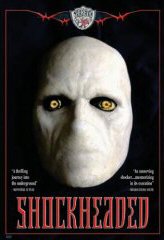
An experimental film fusing fragmented narrative consciousness with shocking, stylized images hinting at deeper possible sub-texts, Shockheaded is more of an 'anti-film' than a traditional movie intended to simply entertain. While often lacking technological polish and professionalism, the film tells an intriguing story of deception and fragmented realities with undeniable energy. Clearly seeped in the excess and sensationalism of exploitation films, owing some of its shadowy identity to the aesthetic values of the horror film, this descent into dementia is not a paint-by-numbers genre film. Occupying a borderland between realism and dark fantasy, the film shadow-walks the nightmarish territory between waking life and disorientating dream, defying conventional interpretations in both its subject matter and presentation. Neither wholly saddled in the pretentious camp of the art film, designed to appeal to no one but its creators, nor an easily sellable 'popular' film aimed at selling popcorn, Shockheaded is that rarest of beasts -- a personal vision of anxiety and primal mystery appealing to the anxieties of its audience without surrendering all its secrets. In fact, viewers searching for 'sense' are continually frustrated, tantalized by possible meaning.
A cultural Outsider, Noble (Jason Wauer) is a hard-drinking anti-hero whose grim interiors mirror the grimy alienation and cynical darkness of his used-up, thrift-store life. A man whose entire existence resembles a poor mirror-image of someone else's, he moves into a new apartment and finds that someone lived there before him -- a tenant who mysteriously disappeared. Noble is soon forced to realize that his fate is conjoined with this shadowy ghost of a secret identity, as he's coerced into searching for the mysterious woman who once occupied his hotel room. Menaced by two noir-inspired policemen (or are they?) who claim they wish to locate the same woman to collect on a debt, and a phantasmagorical gentleman disguised in dark glasses and umbrella known as "the empty man," this story resonates with the nameless dread shared by such novels as Kafka's The Castle and The Trial (although not as effectively).
With these disruptions shoved into the wheels of his hang-dog life, it isn't long before prophetic nightmares and freak coincidences throw Nobel's sleep-walking existence into greater turmoil, seeping in chaos as he embarks upon a quest he neither wants nor fully understands. When he notices the woman's image (Debbie Rochon) on a pirate TV station focusing on disturbing erotic imagery (shades of Videodrome?), he finds himself thrust into a terrifying tryst of leather-clad fetishists whose hunger and shadowy agendas lure him deeper into what can only be described as a daring explosion of surrealist-noir. A love song to lewdness, subjectivity, and the sadism, the ending is as pumped full of adrenaline as it is charged with insight, provoking audiences by refusing to unravel its secrets.
Equally unsettling and inspirational in its joyful carnage and carnality -- all of which are depicted by a minimalist budget and yet startlingly intimate camera work -- this post-modern piece of expressionism reveals a universe, a form of possible existence, whose ambiguity is partially created by our own flawed perceptions. This is one area where the suspense reaches an impressive pinnacle. The director mirrors the disturbing surface terrors of his story by a reinforced emphasis on his character's search for meaning. Events are akin to ghosts, with misleading specters of implication haunting Outsiders. The present is little more than a pre-determined nightmare evoked by ruined pasts, and perception -- the very intellectual and emotional tool by which we define the world and our place within it -- is subverted from within, leaving its befuddled victims of coincidence and devious design victims of a world that they can neither recognize, properly define, or respond to. Worse yet, the loss of personal identity looms large herein, no less a monster than an actual physical manifestation, and, in fact, much more disturbing. Shockheaded make the old new by questioning not only appearances but how we perceive them. In a time when cinema magic can evoke any form of creature or scene with not-so-special effects, this mad dream of identity is impressive precisely because its special effects are intellectual, not physical, weaving its powerful effect subconsciously, much like a dream.
Thornett never uses the surreal to disguise an unsure story or unrealized characters (as do so many other storytellers who fail to realize that even the absurd must make a dream-like instinctive feeling to some sense to successfully engage an audience), instead emphasizing his general themes of isolation, perversion, and meaningless in a malignant universe. While the performances are lackluster, the acting often clumsy, the story is disturbing enough to retain our attention.
85 minutes of inspired if budget-hampered video madness are surrounded by Heretic's supplements, including deleted and alternate scenes which are enjoyable if not particularly revealing, DVD-ROM downloadable music tracks, and what I suspect is a joke extra, wherein one of the female cast members plays dumb for the cameras in a mock interview which reveals, well, nothing. Of more substance is the audio commentary with director Eric Thornett, star Jason Wauer, and music composer Jason Russler, Perhaps the best extras are the films of other Heretic titles and the enjoyably wacky "Spider Ghost," a short film that is simply hilarious! So bad its good doesn't even begin to describe this conflict between a snob and the rubber talking spider-"Haint" that wants to watch porn, eat pork rinds, and pisses in the soup.
Review by William P. Simmons
| Released by Heretic Films |
| Region 1 - NTSC |
| Not Rated |
| Extras : |
| see main review |